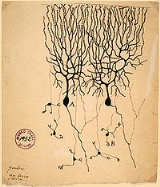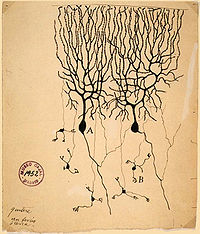
Neuroculture
Encyclopedia
NeuroCulture is the relation between the sciences that study the functioning of the brain and culture. We understanding the latter as the knowledge, history, habits, ideas and values of the human
race, and their manifestations in any form of expression: social, scientific, artistic, philosophical, moral or religious, etc.
 The basis of NeuroCulture
The basis of NeuroCulture
is that everything a human being creates is generated in the brain
, from the most primary functions resulting from millions of years of evolution, to superior expressions, like art, religious or scientific thinking
. Thus, the link that relates the biological functioning of the brain to the results of its processes creates a method of explaining how human beings respond to their environment in every possible way.
The study of human beings has been analysed by many scientific and humanistic branches of knowledge, such as philosophy
, sociology
, anthropology
, psychology
, theology
, ethics
, and jurisprudence
. The understanding we have nowadays of the way the brain works makes it impossible for these disciplines to ignore that it is the brain that creates and organizes thoughts, which lead to data, deductions, structures, laws and, ultimately, the content that conforms them.
Neuroscience
, together with the humanistic and scientific disciplines, creates a new level of study that leads to a reassessment of some of its fields of study and, of course, the enrichment of all of them.
According to this approach, in which Neuroscience joins the rest of the humanistic and scientific disciplines, new related terms appear. For example, we have NeuroEconomy, NeuroPhilosophy
, NeuroEthics
, NeuroTheology
, NeuroEsthetics
, NeuroCognition or NeuroEducation
. Any area of study is prone to be related to Neuroscience.
Regardless of the cultural society we are dealing with, the functioning of the brain has characteristics that are common to every society and race on the Earth. These characteristics have been confirmed through magnetic resonance imaging
and it has been verified that emotions and feelings related to morals, love, pleasure, etc., activate the same brain areas whatever the society or race we are dealing with. The only differences are due to the way diverse cultures interpret the facts, ways of life or moral beliefs in one way or another
Human
Humans are the only living species in the Homo genus...
race, and their manifestations in any form of expression: social, scientific, artistic, philosophical, moral or religious, etc.

Neuroculture
NeuroCulture is the relation between the sciences that study the functioning of the brain and culture. We understanding the latter as the knowledge, history, habits, ideas and values of the human race, and their manifestations in any form of expression: social, scientific, artistic,...
is that everything a human being creates is generated in the brain
Brain
The brain is the center of the nervous system in all vertebrate and most invertebrate animals—only a few primitive invertebrates such as sponges, jellyfish, sea squirts and starfishes do not have one. It is located in the head, usually close to primary sensory apparatus such as vision, hearing,...
, from the most primary functions resulting from millions of years of evolution, to superior expressions, like art, religious or scientific thinking
Scientific method
Scientific method refers to a body of techniques for investigating phenomena, acquiring new knowledge, or correcting and integrating previous knowledge. To be termed scientific, a method of inquiry must be based on gathering empirical and measurable evidence subject to specific principles of...
. Thus, the link that relates the biological functioning of the brain to the results of its processes creates a method of explaining how human beings respond to their environment in every possible way.
The study of human beings has been analysed by many scientific and humanistic branches of knowledge, such as philosophy
Philosophy
Philosophy is the study of general and fundamental problems, such as those connected with existence, knowledge, values, reason, mind, and language. Philosophy is distinguished from other ways of addressing such problems by its critical, generally systematic approach and its reliance on rational...
, sociology
Sociology
Sociology is the study of society. It is a social science—a term with which it is sometimes synonymous—which uses various methods of empirical investigation and critical analysis to develop a body of knowledge about human social activity...
, anthropology
Anthropology
Anthropology is the study of humanity. It has origins in the humanities, the natural sciences, and the social sciences. The term "anthropology" is from the Greek anthrōpos , "man", understood to mean mankind or humanity, and -logia , "discourse" or "study", and was first used in 1501 by German...
, psychology
Psychology
Psychology is the study of the mind and behavior. Its immediate goal is to understand individuals and groups by both establishing general principles and researching specific cases. For many, the ultimate goal of psychology is to benefit society...
, theology
Theology
Theology is the systematic and rational study of religion and its influences and of the nature of religious truths, or the learned profession acquired by completing specialized training in religious studies, usually at a university or school of divinity or seminary.-Definition:Augustine of Hippo...
, ethics
Ethics
Ethics, also known as moral philosophy, is a branch of philosophy that addresses questions about morality—that is, concepts such as good and evil, right and wrong, virtue and vice, justice and crime, etc.Major branches of ethics include:...
, and jurisprudence
Jurisprudence
Jurisprudence is the theory and philosophy of law. Scholars of jurisprudence, or legal theorists , hope to obtain a deeper understanding of the nature of law, of legal reasoning, legal systems and of legal institutions...
. The understanding we have nowadays of the way the brain works makes it impossible for these disciplines to ignore that it is the brain that creates and organizes thoughts, which lead to data, deductions, structures, laws and, ultimately, the content that conforms them.
Neuroscience
Neuroscience
Neuroscience is the scientific study of the nervous system. Traditionally, neuroscience has been seen as a branch of biology. However, it is currently an interdisciplinary science that collaborates with other fields such as chemistry, computer science, engineering, linguistics, mathematics,...
, together with the humanistic and scientific disciplines, creates a new level of study that leads to a reassessment of some of its fields of study and, of course, the enrichment of all of them.
According to this approach, in which Neuroscience joins the rest of the humanistic and scientific disciplines, new related terms appear. For example, we have NeuroEconomy, NeuroPhilosophy
Neurophilosophy
Neurophilosophy or philosophy of neuroscience is the interdisciplinary study of neuroscience and philosophy. Work in this field is often separated into two distinct methods. The first method attempts to solve problems in philosophy of mind with empirical information from the neurosciences...
, NeuroEthics
Neuroethics
Neuroethics is the ethics of neuroscience, and the neuroscience of ethics.The ethics of neuroscience deals with matters as a subclass of bioethics...
, NeuroTheology
Neurotheology
Neurotheology, also known as spiritual neuroscience, is the study of correlations of neural phenomena with subjective experiences of spirituality and hypotheses to explain these phenomena....
, NeuroEsthetics
Neuroesthetics
Neuroesthetics is a relatively recent sub-discipline of empirical aesthetics. Empirical aesthetics takes a scientific approach to the study of aesthetic perceptions of art and music. Neuroesthetics received its formal definition in 2002 as the scientific study of the neural bases for the...
, NeuroCognition or NeuroEducation
Neuroeducation
Neuroeducation is an "interdisciplinary field that combines neuroscience, psychology and education to create improved teaching methods and curricula"...
. Any area of study is prone to be related to Neuroscience.
Regardless of the cultural society we are dealing with, the functioning of the brain has characteristics that are common to every society and race on the Earth. These characteristics have been confirmed through magnetic resonance imaging
Magnetic resonance imaging
Magnetic resonance imaging , nuclear magnetic resonance imaging , or magnetic resonance tomography is a medical imaging technique used in radiology to visualize detailed internal structures...
and it has been verified that emotions and feelings related to morals, love, pleasure, etc., activate the same brain areas whatever the society or race we are dealing with. The only differences are due to the way diverse cultures interpret the facts, ways of life or moral beliefs in one way or another
See also
- Behavioural geneticsBehavioural geneticsQuantitative human behavioural genetics is a specialisation in the biological field of behaviour genetics that studies the role of genetics in human behaviour employing quantitative-genetic methods. The field is an overlap of quantitative genetics and psychology...
- Behavioral neuroscienceBehavioral neuroscienceBehavioral neuroscience, also known as biological psychology, biopsychology, or psychobiology is the application of the principles of biology , to the study of physiological, genetic, and developmental mechanisms of behavior in human and non-human animals...
- Biocultural evolutionBiocultural evolutionBiocultural evolution refers to historical evolutionary processes that occur as a result of culture's interaction with biology.-Cultural factors:...
- Human behavioral ecologyHuman behavioral ecologyHuman behavioral ecology or human evolutionary ecology applies the principles of evolutionary theory and optimization to the study of human behavioral and cultural diversity. HBE examines the adaptive design of traits, behaviors, and life histories of humans in an ecological context...
- Human genetic variationHuman genetic variationHuman genetic variation refers to genetic differences both within and among populations. There may be multiple variants of any given gene in the human population , leading to polymorphism. Many genes are not polymorphic, meaning that only a single allele is present in the population: that allele is...
- NeuroanthropologyNeuroanthropologyNeuroanthropology is the study of culture and the brain. This field explores how new findings in the brain sciences help us understand the interactive effects of culture and biology on human development and behavior...
- Sociocultural evolutionSociocultural evolutionSociocultural evolution is an umbrella term for theories of cultural evolution and social evolution, describing how cultures and societies have changed over time...
- Social neuroscienceSocial neuroscienceSocial neuroscience is an interdisciplinary field devoted to understanding how biological systems implement social processes and behavior, and to using biological concepts and methods to inform and refine theories of social processes and behavior. Humans are fundamentally a social species, rather...
- Race, Evolution, and Behavior: A Life History PerspectiveRace, Evolution, and BehaviorRace, Evolution, and Behavior: A Life History Perspective is a controversial book written by J...

